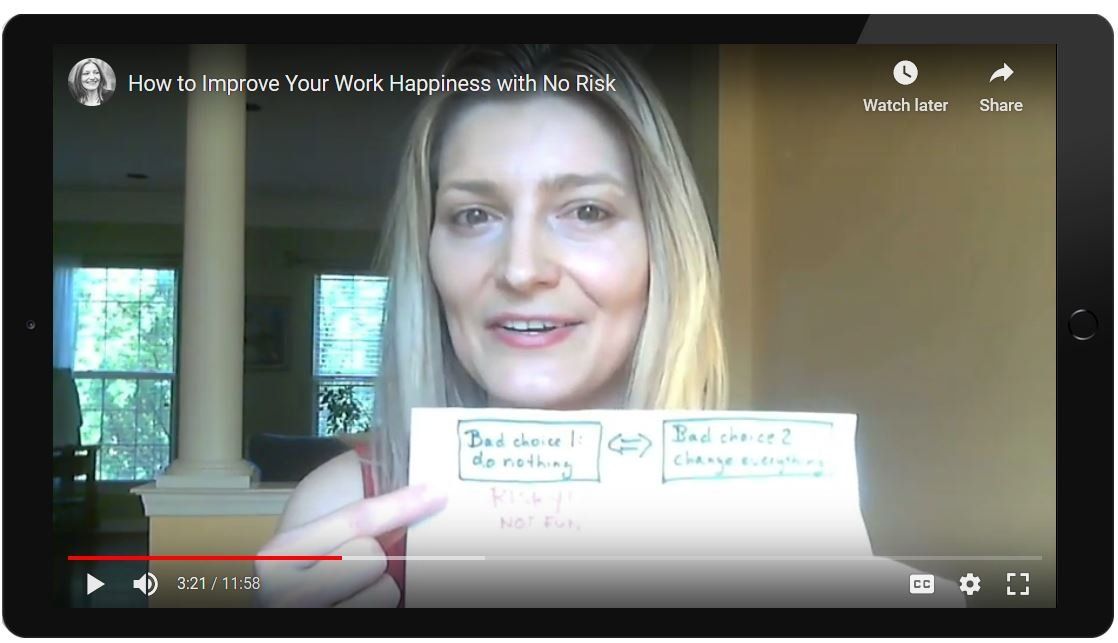Saying No: How the Magic of This Word Can Free You
Why should you practice saying no?
Well, have you ever noticed how your to-do list sometimes becomes longer and longer, regardless of how much effort you put into reducing it?
In the midst of that ever-expanding list, what is most important can get lost in the haze. While it may be challenging to free yourself from all the demands placed on you, it all begins with one simple but magic word.
That magic word is:
"No."
It makes us more focused and more directed. According to some news articles, saying no can even make us more successful!
The truth is that you simply cannot focus on our passion and purpose, on what is most meaningful and important to you if you say "yes" to everything. However, changing how you feel about the word “no” is one of the biggest steps you can take to improve your life.
Continue reading below for a process that can help you feel more comfortable with saying no.
To get the most out of this, watch the video and then read the rest of the article. (There's also a Podcast version of "Saying No: Why It's Hard & How to Get Better"
if you'd prefer to listen to this while exercising or commuting.)
While this is a never-ending journey, here are four steps that can help you get started:
1. Become aware of your preferences
In most cultures, it’s not only salespeople who dislike the word “no.” Many people subconsciously prefer its more positive counterpart.
You can easily find out if you have a similar preference by saying “yes” and “no” out loud. How does the first word make you feel in comparison with the second?
In my experience, most people who do this exercise feel better when they say “yes.” They might report that it sounds uplifting, or they may notice a sense of possibility, openness, and movement.
In contrast, saying “no” can have a more distancing energy tied into its meaning. It can feel like you are shutting things down, and it may even threaten your sense of belonging to a group. Many of you may have learned during adolescence that in some group settings saying “no” to a suggestion would make you the outsider.
2. Become aware of the personal meaning we ascribe to the word “no"
In addition to the cultural and group-related reasons above, many people dislike the word “no” for personal reasons.
Specifically, it is common to make this word about oneself, and one's values. If a magazine doesn’t accept your article, if a company doesn’t respond to your job application, or if a person you dated never gets back to you, a typical (and understandable) response is to feel like you are not good enough for them, or that something is wrong with you.
Similarly, you may not like saying “no” out of fear that the other person will feel rejected.
3. Changing the story of what “no” means
But what happens if you changed your internal story about what “no” means?
What if a “no” were not actually a judgment about your value as a human (or as a writer, an employee, or a date), but just a judgment of the fit between what someone is seeking out and what you can offer?
Let me use a personal example: when talking with potential coaching clients, some of them will decide that what I have to offer is not for them. Now, I could choose to take their “no” (or “not yet”) as a value judgment about me as a person, or at least about me as a coach.
However, the truth is that their “no” is not about my value, just as my “no” wouldn’t be about their value. A “no” is merely about the appropriateness of the fit between us, as well as the timing of our connection. Ultimately, it boils down to whether what someone is looking for is a good fit with what I can offer.
The best thing I could do for them (and myself) is to tell them as soon as possible that I don’t have what they are looking for.
4. Seeing the value of the word “no”
Many people would hate to hear the word “no” from a person they went on a date with—even if they themselves had no interest in pursuing a relationship with them.
I believe that is because they do not see the perniciousness of an inauthentic “yes.” What I mean by that is a “yes” when they actually want to say “no."
When you hear such a “yes,” it may temporarily make you feel better about yourself. It may give you hope that you have a potential partner, job opportunity, or customer in front of you. The problem is that unless the “yes” is authentic, this hope is not based on reality. Thus, an inauthentic “yes” can lead to you wasting time and energy going down a dead end, instead of spending it somewhere where it could yield great results.
Similarly, when you say “yes” to another person (even though they are a “no” for you), you may temporarily feel better because you think you are not hurting someone by “rejecting” them. However, expressing an authentic “no” is often the kindest thing you can do in a situation where there’s not a fit. In addition to saving both of you time and energy, it gives clarity and direction.
A genuine “no” can help everyone involved to find their authentic “yes.” And what greater gift could we give to, or receive from anyone?
As Richie Norton put it: “Say no to everything, so you can say yes to the one thing.”
P.S.: Would you like to get my support?
I'd love to connect with you if you want to explore this possibility.
While I often call this "work you love coaching," what I really do is help my clients create a life they love. Because your work-related goals are really not separate from what you want in other areas of your life.
So, in addition to helping clients find their passion, increase their productivity, or solve business-related issues, I also support them with their goals in other areas (such as family or relationships).
You can read more about what I do here.
A version of this article was first published on elephant journal here.





